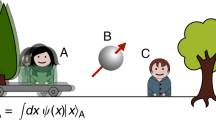Abstract
If an absolute reference frame with respect to time, position, or orientation is missing one can only implement quantum operations which are covariant with respect to the corresponding unitary symmetry group G. Extending observations of Vaccaro et al., I argue that the free energy of a quantum system with G-invariant Hamiltonian then splits up into the Holevo information of the orbit of the state under the action of G and the free energy of its orbit average. These two kinds of free energy cannot be converted into each other. The first component is subadditive and the second superadditive; in the limit of infinitely many copies only the usual free energy matters.
Refined splittings of free energy into more than two independent (non-increasing) terms can be defined by averaging over probability measures on G that differ from the Haar measure.
Even in the presence of a reference frame, these results provide lower bounds on the amount of free energy that is lost after applying a passive covariant channel. If the channel properly decreases one of these quantities, it decreases the free energy necessarily at least by the same amount, since it is unable to convert the different forms of free energies into each other. For instance, if an electrical, optical, or acoustical signal loses some time accuracy after it has passed a passive time-invariant device, the results provide lower bounds on the free energy lost in the latter.
Similar content being viewed by others
References
H. Callen. Thermodynamics. J. Wiley and Sons, New York, 1960.
O. Bratteli and D. Robinson. Operator algebras and quantum statistical mechanics. Springer, vol. 2, New York, 1987.
A. Allahverdyan and T. Nieuwenhuizen. Resolution of the Gibbs paradox via quantum thermodynamics. http://xxx.lanl.gov/abs/quant-ph/0507145.
L. Szilard. Über die Entropieverminderung in einem thermodynamischen System bei Eingriffen intelligenter Wesen. Z. Phys. 840–856 (1929).
D. Janzing, P. Wocjan, R. Zeier, R. Geiss and Th. Beth. Thermodynamic cost of reliability and low temperatures: Tightening Landauer’s principle and the Second Law. Int. Jour. Theor. Phys. 39(12):2217–2753 (2000).
D. Janzing. A quasi-order of resources as a new concept for a thermodynamic theory of quantum state preparation. In Sciences of the interface, Tübingen, 2000. Genista Verlag.
R. Landauer. Irreversibility and heat generation in the computing process. IBM J. Res. Develop. 5:183–191 (1961).
C. Bennett. The thermodynamics of computation–a review. Int. J. Theor. Phys. 21:905–940 (1982).
M. Ohya and D. Petz. Quantum entropy and its use. Springer Verlag, 1993.
A. Allahverdyan, R. Balian and T. Nieuwenhuizen. Quantum thermodynamics: thermodynamics at the nanoscale. Journ. Mod. Opt. 51:2703–2711 (2004).
A. Allahverdyan, R. Balian and T. Nieuwenhuizen. Maximal work extraction from quantum systems. Europhys. Lett 67:565 (2004).
D. Janzing and T. Beth. Quasi-order of clocks and their synchronism and quantum bounds for copying timing information. IEEE Trans. Inform. Theor. 49(1):230–240 (2003).
G. Chiribella, G. D’Ariano, P. Perinotti and M. Sacchi. Efficient use of quantum resources for the transmission of a reference frame. Phys. Rev. Lett. 93:180503 (2004).
T. Rudolph and L. Grover. On the communication complexity of establishing a shared reference frame. Phys. Rev. Lett. 217905 (2003).
S. Bartlett, T. Rudolph and W. Spekkens. Decoherence-full subsystems and the cryptographic power of a private reference frame. Phys. Rev. A 70:032307 (2004).
D. Janzing and T. Beth. Synchronizing quantum clocks with classical one-way communication: Bounds on the generated entropy. http://xxx.lanl.gov/abs/quant-ph/0306023v1.
J. Vaccaro, F. Anselmi, H. Wiseman, and K. Jacobs. Complementarity between extractable mechanical work, accessible entanglement, and ability to act as a reference frame, under arbitrary superselection rules. http://xxx.lanl.gov/abs/quant-ph/0501121.
M. Nielsen and I. Chuang. Quantum Computation and Quantum Information. Cambridge University Press, 2000.
D. Janzing. Decomposition of time-covariant operations on quantum systems with continuous and/or discrete energy spectrum. Journ. Math. Phys. 122107 (2005).
D. Poulin. Toy model for a relational formulation of quantum theory. http://xxx.lanl.gov/abs/quant-ph/0505081.
M. Horodecki, P. Horodecki, and J. Oppenheim. Reversible transformations from pure to mixed states, and the unique measure of information. Phys. Rev. A 67:062104 (2003).
G. Lindblad. Completely positive maps and entropy inequalities. Comm. Math. Phys. 40:147–151 (1975).
E. Hewitt and K. Ross. Abstract Harmonic Analysis, vol. I. Springer, 1963.
D. Janzing. On the computational power of molecular heat engines. J. Stat. Phys., (Online DOI: 10.1007/s10955-005-8015-9), 2006.
Y. Aharonov, J. Oppenheim, S. Popescu, B. Reznik and W. Unruh. Measurement of time-of-arrival in quantum mechanics. Phys. Rev. A 57:4130 (1998).
Author information
Authors and Affiliations
Corresponding author
Rights and permissions
About this article
Cite this article
Janzing, D. Quantum Thermodynamics with Missing Reference Frames: Decompositions of Free Energy Into Non-Increasing Components. J Stat Phys 125, 761–776 (2006). https://doi.org/10.1007/s10955-006-9220-x
Received:
Accepted:
Published:
Issue Date:
DOI: https://doi.org/10.1007/s10955-006-9220-x




